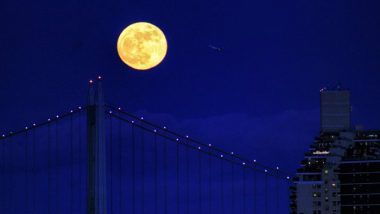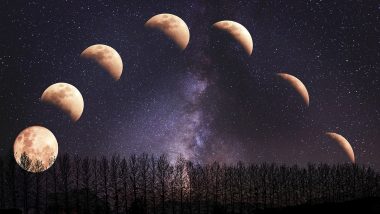A rare lunar eclipse event popularly called the Blue Moon will occur at the end of this month. On 31st January 2018, the first eclipse of 2018 will take place. It will happen during the middle of the night and Central and eastern Asia will get a good view of the same in the evening sky. For the Indian subcontinent, the Middle East and Eastern Europe, the eclipse will already be underway as the moon rises. This eclipse involves second full moon of the calendar month, a phenomenon which is happening for the first time in 150 years.
Are Supermoon and Blue Moon The Same?
A supermoon is a phenomenon which occurs when the moon appears full on the same day when it is closest in its orbit around the Earth. While a blue moon refers to the second full moon of any month. In fact, three celestial events- a supermoon, a blue moon and a lunar eclipse are occurring in January.
At the start of the year was the supermoon, which was the biggest and brightest one for 2018, stated NASA. After 31st January, the next supermoon will be seen towards the end of March. So, the first quarter of 2018 itself will see two blue moons!
The blue moon towards the end of January could appear with a reddish tinge in some parts because of the total lunar eclipse. Hence, some also refer to it as the blood moon. The duration of this phase is for 77 minutes, the moon tracking through the southern part of Earth’s shadow. During this, the moon’s lower limb will be seen brighter than the dark upper limb. Alaska, Hawaii and North-Western Canada will see the eclipse from start to finish.
Why is it called the Blue Moon?
The name blue moon has nothing to do with its colour. It doesn’t appear blue but it gets the term from the word ‘blewe,’ the old English word for betrayal. According to the lunar calendar, a year would see 12 full moons, so when it appears for the 13th time, it is betraying the lunar cycle. Although, the moon can appear a little blue is the atmosphere has much dust.
Where and How To Watch It?
Those staying in Mumbai can observe the sky on 31st January 2018 from 6.27 pm.
Delhi people can observe the sky from 5.53 pm.
Kolkatta residents can observe the sky from 5.16 pm.
Bangalore residents can observe the sky from 6.15 pm.
The eclipse will end at 9.38 pm.
If you love observing the stars and the moon, then gear yourself for the Blue Moon. It is a rare event and you wouldn’t wanna miss this. Before 2017, there was an eight per cent partial eclipse occurrence on December 31, 2009. But the last total eclipse of a Blue Moon happened all the way back on March 31, 1866.
(The above story first appeared on LatestLY on Jan 04, 2018 11:34 AM IST. For more news and updates on politics, world, sports, entertainment and lifestyle, log on to our website latestly.com).













 Quickly
Quickly




















